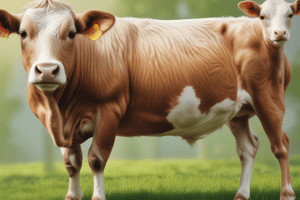Podcast
Questions and Answers
How does understanding DNA contribute to genetic improvement in animals?
How does understanding DNA contribute to genetic improvement in animals?
Understanding DNA allows identification of animals with high genetic merit, enabling farmers to select for desirable traits.
What physical trait is characteristic of Aberdeen Angus cattle and how is it determined genetically?
What physical trait is characteristic of Aberdeen Angus cattle and how is it determined genetically?
Aberdeen Angus cattle are naturally polled, determined by a dominant gene that prevents horn development.
Explain the concept of performance testing in cattle evaluation.
Explain the concept of performance testing in cattle evaluation.
Performance testing involves comparing a bull's weight gain and feed conversion ratio with others under similar conditions.
What is the difference between performance testing and progeny testing?
What is the difference between performance testing and progeny testing?
Define line breeding and its significance in animal genetics.
Define line breeding and its significance in animal genetics.
Why is progeny testing considered more reliable than performance testing?
Why is progeny testing considered more reliable than performance testing?
Discuss how selective breeding can impact the genetic diversity of a population.
Discuss how selective breeding can impact the genetic diversity of a population.
Why is it important for farmers to monitor feed conversion ratios in bulls?
Why is it important for farmers to monitor feed conversion ratios in bulls?
What is natural selection and how does it influence breeding practices?
What is natural selection and how does it influence breeding practices?
What is a deleterious gene and how does it affect animal fitness?
What is a deleterious gene and how does it affect animal fitness?
Flashcards are hidden until you start studying
Study Notes
Understanding DNA and Genetic Improvement
- Identifying animals with high genetic merit allows farmers to select for desirable traits, enhancing overall livestock quality.
Aberdeen Angus Cattle
- Characterized by being naturally polled (hornless) due to a dominant gene preventing horn development.
Performance Testing in Cattle
- Involves comparing a bull's weight gain and feed conversion ratio against peers under similar conditions to evaluate growth efficiency.
Performance Testing vs. Progeny Testing
- Performance testing measures a bull's own performance directly; progeny testing evaluates the success of its offspring, providing insights into genetic potential.
Line Breeding
- A selective breeding method focusing on specific bloodlines to enhance desired traits, aiming to combine favorable qualities over generations.
Reliability of Progeny Testing
- Progeny testing is regarded as more reliable due to its assessment of breeding animals based on their offspring's performance, reflecting hereditary traits more accurately than individual performance.
Genetic Diversity and Selective Breeding
- Selective breeding can reduce genetic diversity by emphasizing specific traits, leading to a narrower gene pool and potential long-term risks for the population.
Feed Conversion Ratios
- Monitoring feed conversion ratios is crucial for evaluating feed efficiency, which directly affects farm profitability and livestock productivity.
Natural Selection
- Refers to the survival and reproductive advantage of organisms best adapted to their environments, shaping breeding practices by promoting traits that enhance fitness and survival.
Deleterious Genes
- These genes negatively affect an organism's fitness, decreasing survival and reproductive success; an example includes the Brachyspina gene in Holsteins, which impacts embryonic development.
Cloning in Agricultural Biotechnology
- Cloning involves creating genetically identical organisms, offering benefits in ensuring desired traits are preserved and enhancing production efficiency in agriculture.
Studying That Suits You
Use AI to generate personalized quizzes and flashcards to suit your learning preferences.




